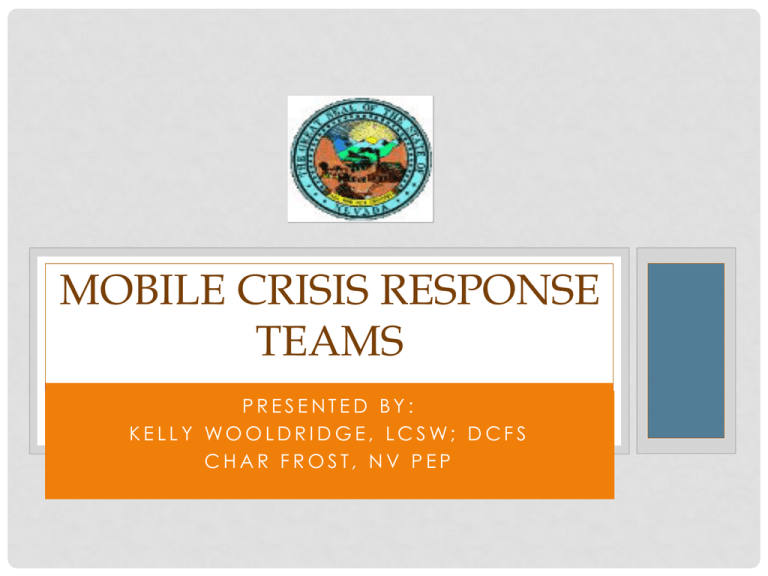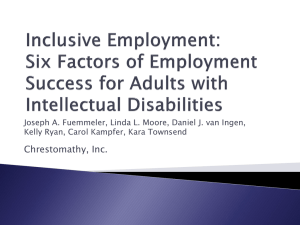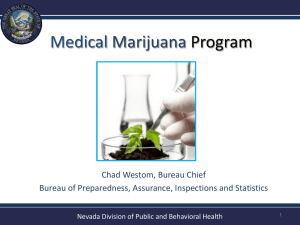Mobile Crisis Response Team - Nevada Public Health Foundation
advertisement

MOBILE CRISIS RESPONSE TEAMS PRESENTED BY: KELLY WOOLDRIDGE, LCSW; DCFS CHAR FROST, NV PEP IDENTIFIED NEED • In Nevada, studies have suggested that 19.3% of elementary school children have behavioral health care needs and over 30% of adolescents selfreported significant levels of anxiety or depression (CCCMHC, 2010). IDENTIFIED NEED • In 2009, almost one-quarter of Nevada’s public middle school students seriously thought about killing themselves, more than 30% had used alcohol or illegal drugs, and over 13% had attempted suicide (CCCMHC, 2010). IDENTIFIED NEED • Without easy access to crisis intervention and stabilization services, families have been forced to utilize local emergency rooms in order to obtain behavioral health care for their children. The National Center for Children in Poverty has identified youth emergency room visits for behavioral health care as a national problem (Cooper, 2007). IDENTIFIED NEED • Child behavioral health-related visits to hospital emergency rooms have increased steadily in Nevada over the last five years. There is also an increasing trend of children requiring a costly inpatient admission to a hospital due to a behavioral health crisis. • Data collected by the Center for Health Information Analysis (CHIA) through the University of Nevada Las Vegas demonstrates both trends. IDENTIFIED NEED Youth Admitted to an In-Patient Hospital for Behavioral Health Clark County 7000 6000 5000 4000 3000 2000 1000 0 Total Center for Health Information Analysis (CHIA) 2009 2010 2011 2012 4974 5587 5869 6250 IDENTIFIED NEED Center for Health Information Analysis (CHIA) IDENTIFIED NEED Data for the first two quarters of 2013 continues to show an increase in the number of youth admitted to emergency rooms for a mental health crisis. • Clark County ED Admissions: 3319 • Clark County In-patient Admissions: 3496 • Washoe County ED Admissions: 1521 • Washoe County In-patient Admissions: 1742 MOBILE CRISIS PROGRAM 2013 Legislative Session approved funding for a “mini mobile crisis program” in Clark County. • Clark County Children’s Mental Health Consortium, Nevada PEP, and the Division of Child and Family Services developed and implemented the Mobile Crisis Response Team. PLANNING AND DEVELOPMENT PROCESS Establish the Need Collect and analyze data from the Center for Health Care Analysis and local Emergency Departments. Partner with the Community Develop memorandum of understanding with the Clark County School District and the University Medical Center in Clark County. Utilize NV PEP contract to implement Family to Family Support. Looked for External Models Reviewed Mobile Crisis Programs in other states. Developed a contract with Milwaukee Wraparound Mobile Crisis Urgent Treatment Team (MUTT) to provide training and consultation. PLANNING AND DEVELOPMENT PROCESS LOGIC MODEL Nevada Division of Child and Family Services Mobile Crisis Intervention - January 2014 New Service Implementation Inputs Staffing: 12 staff to include CPM I, Qualified Mental Health Professionals, Psychiatric Case WorkersTrained in Solution Focused Brief Therapy, Motivational Interviewing, Wraparound, Trauma Informed Care, Crisis Intervention and Stabilization, and Domestic Violence Response Population: Any child or adolescent in Southern Nevada requiring support and intervention for a psychiatric emergency Hours of Operation: 10:00 pm to 7:00 pm 5 days/week- some Saturdays upon implementation Transportation Method: State Vehicles Program Teams: Mobile Crisis Response Team Mobile Crisis Stabilization Team Partnerships: MOUs with selected community partners such as Clark County School District Clark County Children’s Mental Health Consortium and Clark County University Medical Center Evaluation: DCFS Program and Evaluation Unit Outputs Activities Consultation and Information: -Telephone consultation available to families and providers -Telephone triage and referral -Outcome and Output Data collected at time of call (call log) Crisis Assessment Intervention and Stabilization: -Urgent face-to-face homebased or community-based crisis assessment and intervention -Utilize assessment tool, Intake “Crisis Assessment Tool” (CAT) Facilitation of Community Supports and Care: -Provide the family with information and referral to needed resources -Link the family with Nevada PEP -Short term intensive child and family therapy -Immediate care coordination services including linkage with other involved child service agencies and school district services -Utilize assessment tool, Discharge “Crisis Assessment Tool” (CAT) Participation Mobile Crisis Response Team Short -Immediate restoration of safety -Implementation of safety plan -Child and family connected to local and natural supports -Customer satisfaction (child and family) -Facilitate psychiatric hospitalization when necessary Outcomes -- Impact Medium -Child and family are stabilized -Child and family are connected to additional referral service array and Wraparound services -Reduction in crisis indicators (CAT) Long - Reduced Admissions to the Emergency Department for a behavioral health crisis -Reduced length of stay and readmission to inpatient care -Youth remain in their homes and community Mobile Crisis Stabilization Team Assumptions: Supplies/office equipment available and forms and initial procedures will be established. External Factors: Funding, Referral sources and marketing considerations. MOBILE CRISIS RESPONSE TEAM 1 Clinical Program Manager 5 Mental Health Counselor II 5 Psychiatric Caseworkers 1 Administrative Assistant Nevada PEP Family To Family Support Specialist MISSION STATEMENT MCRT strives to help Clark County children and adolescents live safely in their home and community. VALUES • Respond immediately to children and families during times of crisis. • Provide services that are family-driven, culturally competent, community based and consistent with Nevada System of Care principles. • Assure safety and continuity of care through individualized strategies implemented by a wraparound-based, team approach. GOALS 1. Maintain youth in their home and community environment. 2. Promote and support safe behavior in children in their home and community. 3. Reduce admissions to Emergency Departments due to a behavioral health crisis. 4. Facilitate short term in-patient hospitalization when needed. 5. Assist youth and families in accessing and linking to on-going support and services. WHO WE SERVE • The Mobile Crisis Response Team provides crisis intervention services for families of youth under the age of 18 who are having a behavioral health crisis and the behavior threatens the child’s removal from the home, school, and/or community. • Youth who are uninsured, under-insured or have Medicaid Fee For Services are eligible for services SERVICES PROVIDED Telephone Triage: Crises staff are available to provide support over the phone to assist in resolving or preventing a crisis situation. After an intervention screening, a referral will either be made to a community resource or the MCRT will respond. SERVICES PROVIDED Crisis Response If it is determined that further care and support is needed, a response team will be dispatched to the youth and family in crisis. The response team includes a Mental Health Counselor and a Psychiatric Case Worker. They will work to de-escalate the crisis by providing behavioral health intervention and support. The team will develop a crisis plan with the family and youth to facilitate safety. SERVICES PROVIDED Crisis Stabilization Short-term behavioral health intervention provided in or outside of the youth and family home. It is designed to assess, manage, monitor, stabilize and support the youth and families well-being. The team will develop an on-going safety plan with the child, family, and other support services. COMMUNITY PARTNERS • • • • Clark County Children’s Mental Health Consortium Clark County School District University Medical Center Emergency Department Nevada PEP NEVADA PEP FAMILY SUPPORT SERVICES Family Support: Nevada PEP’s Family Support Service is a program devoted to supporting families in advocating for their children that have behavioral healthcare concerns. This national model utilizes the System of Care Framework to deliver family driven, youth guided supports and services to increase successful outcomes at home, in school and in the community. Family Specialists: Family Specialists have gone through many of the same experiences as the families being served. All of Nevada PEP’s Family Specialists are family members of children with mental, emotional and/or behavioral health care needs. NEVADA PEP FAMILY SUPPORT SERVICES Family Specialists… Provide compassion and understanding of the unique experiences and needs of their child and family. • • • • • • • Effective Family Support Components: 1 Informational/educational support 2 Instructional/skills development support 3 Emotional and affirmation support 4 Instrumental support – concrete service 5 Advocacy support 6 Leadership skill building at child and family level and as at system levels MOBILE CRISIS EVIDENCE BASED PRACTICES • Motivational Interviewing • Crisis Assessment Tool (CAT)-used with permission from State of Indiana • Mobile Crisis Safety Plan – from Milwaukee MUTT • Brief Solution Focused Family Therapy • Cognitive Behavior Therapy • Crisis Prevention and Response • Wraparound PROGRAM EVALUATION Information Collected: Crisis Assessment Tool Scores Discharge Crisis Assessment Tool Scores Risk Behavior Checklist Scores Child and Adolescent Functional Assessment Score (CAFAS) Discharge Plan Consumer Satisfaction Survey PROGRAM EVALUATION Information collected at: Intake Discharge 30-Day Post Discharge – Risk Behaviors Only 90-Day Post Discharge – Risk Behaviors Only 6- Month Post Discharge- Risk Behaviors Only PROGRAM EVALUATION Crisis Assessment Tool Rated on a scale: 0 – No Evidence, 1 – History, watch/prevent, 2 – Recent, act, 3- acute, act immediately Risk Behaviors: Suicide Risk, Self-Mutilation, Other Self Harm, Danger to Others, Sexual Aggression, Runaway, Judgment, Fire setting, Social Behavior, Bullying Risk Behavior/Emotional Symptoms: Psychosis, Impulse/Hyperactivity, Depression, Anxiety, Oppositional Behavior, Conduct, Adjustment to trauma, Anger Control, Substance Use PROGRAM EVALUATION Crisis Assessment Tool Rating Scale: 0 - No evidence, 1 – History, watch/prevent, 2- Causing problems consistent with a diagnosable disorder, 3 – Causing severe and dangerous problems Risk Behavior/Emotional Symptoms: Psychosis, Impulse/Hyperactivity, Depression, Anxiety, Oppositional Behavior, Conduct, Adjustment to trauma, Anger Control, Substance Use PROGRAM EVALUATION Crisis Assessment Tool Rated on a scale of 0 – 3 (No evidence, history/mild, moderate, severe) Functional: Living Situation, Community, School, Peer, Developmental, Sleep, Medication Compliance Juvenile Justice: Juvenile Justice status, Community Safety, Delinquency Child Protection: Abuse or Neglect, Domestic Violence PROGRAM EVALUATION Crisis Assessment Tool Rated on a scale of 0 – 3 (No evidence, history/mild, moderate, severe) Caregiver Strengths and Needs: Health, Supervision, Involvement with Care, Social Resources, Residential Stability, Access to Child Care, Family Stress PROGRAM EVALUATION • Discharge plan: ☐ Sent to Stabilization Team ☐ Referred to Insurance ☐ Referred to Community Out-patient Provider ☐ Referred to Nevada PEP ☐ Referred to DCFS Provider ☐ Hospitalized ☐ Family Declined Additional Services ☐ No Services Needed ☐ Other Intake CAFAS Score and Discharge CAFAS Score CURRENT STATUS Team started taking calls January 6, 2014 MOU with UMC Completed February 3, 2014 Numbers Served as of April 30, 2014 # of Telephone Triage Calls: 124 # of Crisis Response youth/families: 76 # of Stabilization youth/families: 43 # of Families receiving Family to Family Support: 39 # of In-Patient Psychiatric Hospitalizations: 6 MOBILE CRISIS RESPONSE TEAMS Questions????




